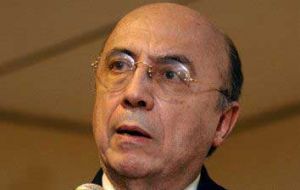MercoPress. South Atlantic News Agency
Brazil anticipating ‘external factors recent evolution’ eases interest rate policy
 Central Bank president Henrique Meirelles
Central Bank president Henrique Meirelles Brazil’s central bank signalled it may stop raising interest rates soon after policy makers unexpectedly slowed the pace of increases and said inflation was less of a threat amid slowing global growth.
The bank’s board, led by Henrique Meirelles, increased the benchmark interest rate half a point from 10.25% to 10.75% Wednesday. The move, which was anticipated by traders in the interest-rate futures market, surprised since a 0.75 percentage point increase had been anticipated, the same as at the bank’s two previous meetings.
After expanding 9% in the first quarter the Brazilian economy is showing signs of slowing down. Evidence suggests the global expansion will wane. Policy makers said in a statement accompanying the decision that inflationary risks have eased since their last meeting because of “the recent evolution of domestic and external factors.”
Consumer prices fell 0.09% in the month through mid- July, the first drop in four years, the statistics agency said this week. Annual inflation slowed to 4.74%, the lowest since February, while still above the bank’s 4.5% target.
Brazil created fewer jobs and collected less tax revenue than expected in June, according to reports last week by the tax agency and the Labor Ministry. Retail sales and industrial output also missed estimates in May.
The Central Bank Selic basic rate will end the year at 12%, according to the median forecast in a bank survey of about 100 economists published July 19.
Brazil’s slowdown comes amid signs that growth in other major economies may cool. In the US, economic data over the past month that were weaker than analysts projected prompted investor speculation that the Federal Reserve may increase monetary stimulus in a bid to keep the economy growing.
Furthermore China’s economic expansion eased to 10.3% in the second quarter from 11.9% in the preceding three months, the statistics bureau said July 15. Industrial-production growth slowed the most since 2008 in June, as regulators shutter energy-intensive factories.
Brazil’s economy is forecasted to slow in the third quarter, after the government phased out tax cuts and cut spending, Finance Minister Guido Mantega said July 15. Central bank increased reserve requirements on cash deposits to 43% from 42% on June 25.




Top Comments
Disclaimer & comment rulesCommenting for this story is now closed.
If you have a Facebook account, become a fan and comment on our Facebook Page!